
As global temperatures continue to break records, with Europe recently experiencing summer temperatures of up to 19.6C on its hottest recorded New Year’s Day ever, the ruling class continues to depend on sham mechanisms of reducing carbon to address the climate crisis. FRFI has previously reported on how carbon markets are being manipulated to generate more profit, giving corporations licence to purchase carbon credits yet continue spewing pollution with no limits,* contrary to their professed impact. A common carbon market manipulation corporations use for this purpose is carbon offsetting, a mechanism that is now being used to expropriate lands from indigenous populations.
Carbon offsetting mechanisms
Carbon offsetting involves assigning an economic value to what the Earth provides for us, a commodification of nature. This requires putting value on not just material goods, like water and wood, but also processes of nature, such as a forest’s ability to capture and store carbon. Carbon offset schemes are derived from a variety of sources which include forest conservation, climate-friendly farming, direct air capture technology, clean cookstoves. Other means of reducing emissions include dubiously measured ones like sustainable educational programmes for children. The amount that any such project reduces emissions is estimated, and this estimate is used to generate a climate credit that can then be sold on the carbon market.
A key component of a ‘viable’ carbon market is the credibility of carbon credit accounting for which there is no international standard. Instead, private entities like Gold Standard, Verra and the American Carbon Registry use a mix of accounting methods to tally, certify and broker offsets. The Guardian and Compensate Foundation, a non-profit carbon offset broker, found that 92% of offsets certified by Gold Standard, Verra and others either failed to offset as much as they claim, or were not permanent, or had damaging side effects for local communities or ecosystems, or some combination of the above. On top of that, some projects are marketed as carbon offsets when in fact, they do nothing to reduce net emissions. Examples of this include selling existing forests that were never in danger of destruction.
Despite such fundamental issues, carbon offsetting projects and carbon credits are being more and more aggressively pursued as a way to continue ‘green’ capitalism, leaving the direct industrial sources of carbon emissions to spew untouched.
Land grabs to fuel green imperialism
This drive towards nature’s commodification is now also being used to justify land expropriation, a new form of ‘green’ imperialism. For decades now, indigenous lands have been ‘legally’ stolen by multinational corporations through state and national court land decisions in dozens of countries for the development of dozens of industries: steel plants in India, agribusiness in Zambia and iron ore mining in Brazil are just a few examples. Currently, these processes disenfranchise people who have lived off these lands for decades (and sometimes centuries) and cut off access to basic survival needs like water, food and livelihood. Most of these industrial projects also have horrific environmental impacts whose tangible effects the same landless people experience as well. A similar process of land expropriation is now being used to develop new carbon offsetting projects that can be traded on the carbon market.
In 2014, Green Resources, a company based in Norway and at the time foremost in the plantation forestry and carbon offset industry of the African continent, was exposed for using violent methods of eviction on the native people living in the Bukaleba Forest Reserve in eastern Uganda and near the Kachung Forest Reserve in northern Uganda. As reported by the Oakland Institute, plantation forestry licences in these areas were obtained for the explicit purpose of carbon credit accreditation, with stated goals of reforesting, maintaining, or managing over 10,000 hectares in these areas. Some evictions began before the formal involvement of Green Resources because of national policies over four decades to facilitate the privatisation and commodification of natural resources and land. However, Green Resources’ corporate land licences were then used as the legal mandate to pursue evictions with tenacity and extreme force, involving the military and police. It is estimated that up to 40,000 people were harmed by these processes.
More recently in 2022, French oil giant Total Energies has denied Congolese farmers access to their own lands in the Lefini natural reserve in pursuit of a carbon offsetting project to plant 40 million trees in the next decade, a collaboration with the Congolese government. Farmers describe being blocked from their lands without payment or consultation after having already planted crops. For many, farming these lands is their only source of food and livelihood that in turn determines their children’s access to education. The few well-established families that were paid were compensated at a paltry rate of 80p per hectare. By the time some compensation had been agreed, the Congolese government had already changed the law to become the private owner of Lefini reserve after which the land was quickly subleased to a French forest consultancy.
In both these expropriations, people indigenous to these lands lost not just access to food, water, and livelihood but also to cultural sites and practices associated with the land. In environmental protection, these indigenous practices are particularly important because they are often more nuanced and balanced methods for protecting and rejuvenating land and water. Currently, despite being only 5% of the global population, Indigenous peoples protect nearly 80% of the world’s biodiversity. The December 2022 COP15 UN Biodiversity Conference conceded the integral role these populations must play as custodians of the land, especially in the face of continued habitat fragmentation and degradation. However, no serious action to preserve the biodiversity and health of our lands can be taken without acknowledging capitalism’s destructive tendency to commodify and sell nature for profit.
Soma Kisan
* ‘Green Capitalism in Crisis’ FRFI 282, June/July 2021
FIGHT RACISM! FIGHT IMPERIALISM! 292 February/March 2023




